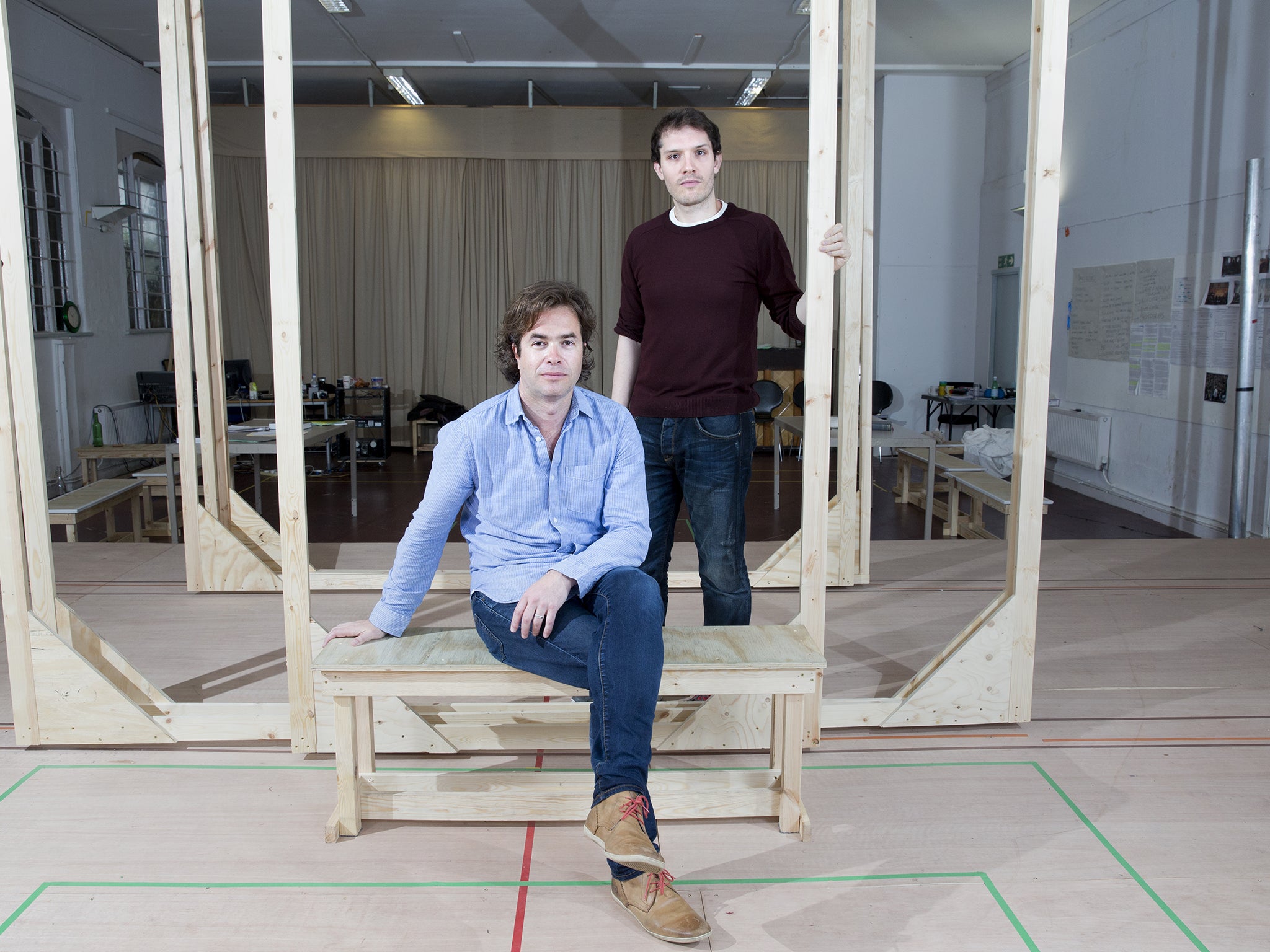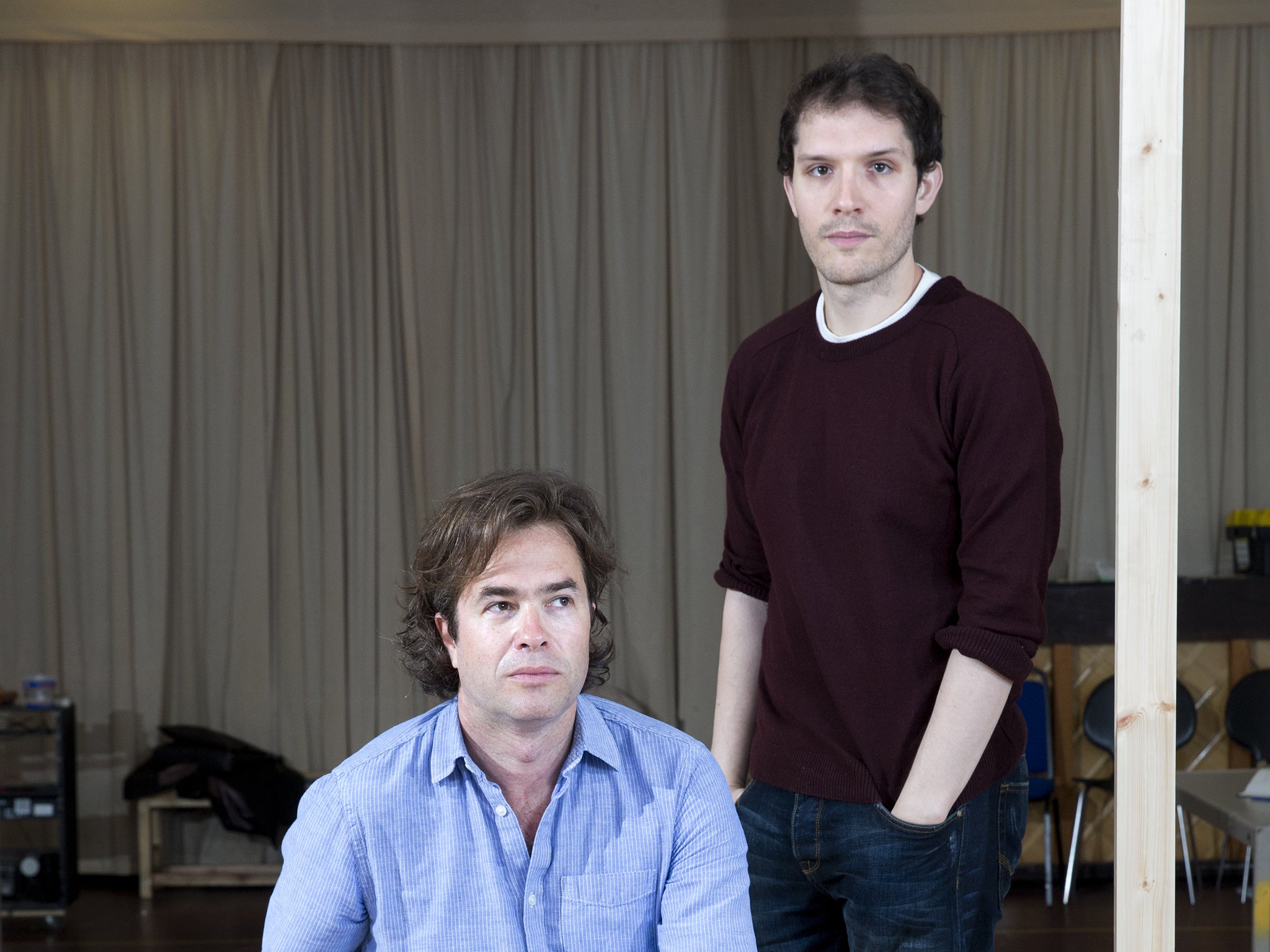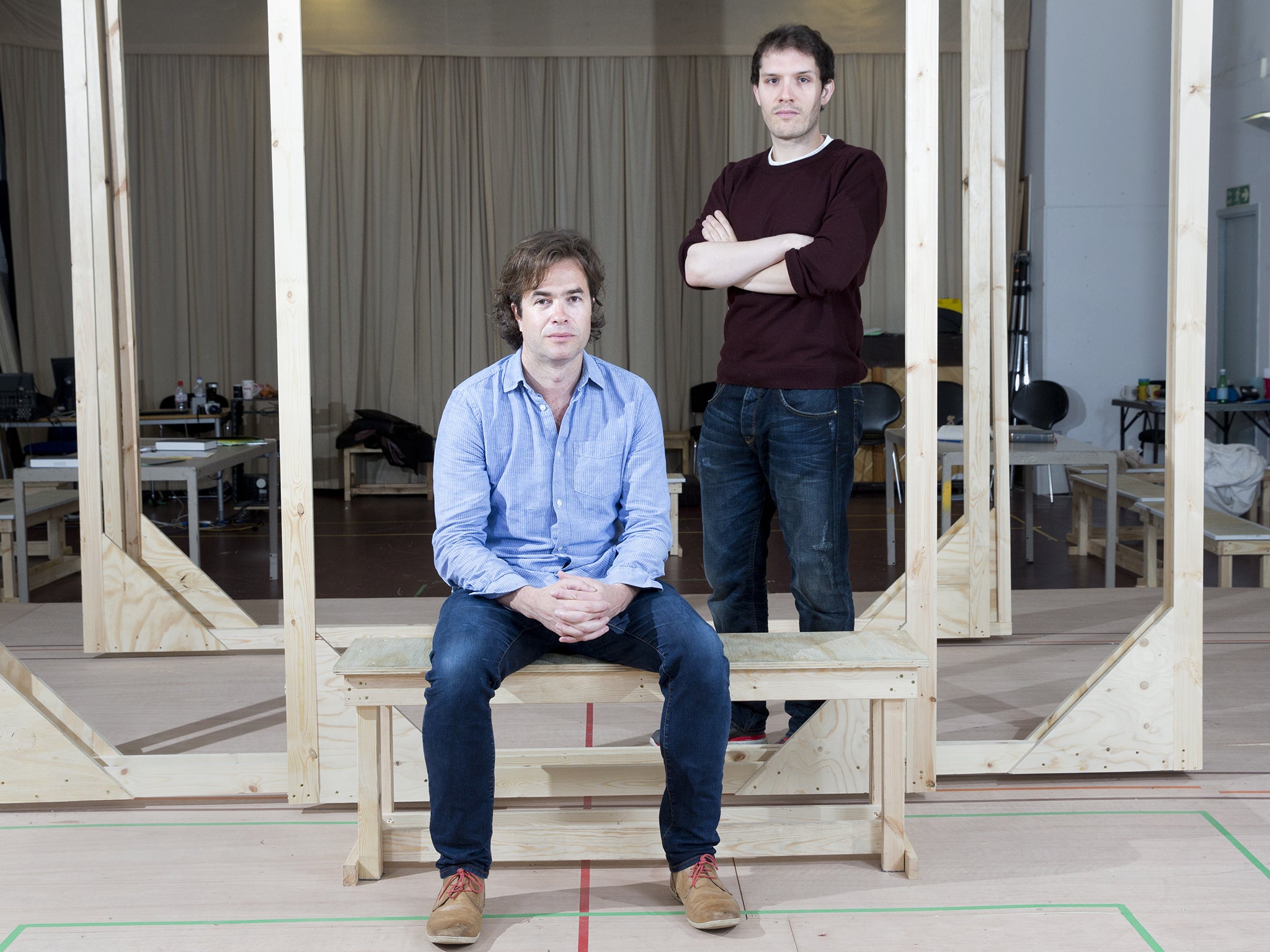Rupert Goold and Robert Icke interview on the Almeida's Greeks season and their creative spark
'Your goal isn’t to shift tickets; it’s to make interesting work'

Meet Rupert and Robert: the former is one of Britain’s most feted theatre directors, the latter one of its most fast-rising.
Rupert Goold, while running the mould-breaking – and hit-making – touring company Headlong, took a punt on Robert Icke, offering him a job as his right-hand man in 2010. When Goold, now 43, became artistic director of north London’s Almeida Theatre three years later, he took Icke – still only 29 – with him.
I meet them both during rehearsals for the first play in Almeida’s hotly-anticipated Greeks season – a new version of The Oresteia, which Icke has written as well as directing. Lack of ambition is not a problem for this pair. Calling each other Rob and Ru, they rapidly get stuck into the meaty questions that surround British theatre today, from funding cuts to the widening gap between London and the regions, right down to what exactly the point of theatre is.
They don’t always have the answers, but there’s an easy throwing around of ideas, complementing and challenging each other – and that was why Goold took on Icke in the first place. “The first thing he said to me when I started at Headlong was that I was useless to him as a ‘yes’ man. Which suited my personality!” laughs Icke. “That was the start of a conversation which is still going on on a daily basis of what theatre is and what theatre’s for. We fight sometimes but we’re now so used to each other, we don’t offend each other.”

This conversation has certainly been fruitful; between them, Goold and Icke have been responsible for some of the most invigorating, hotly-discussed plays of the past five years. Goold’s credits include award-garlanded shows such as Chimerica, The Effect, American Psycho and King Charles III; Icke, meanwhile, scored a huge hit with 1984 – shortly to reopen in the West End before touring – while Mr Burns mystified some critics, but was loved by bloggers and won a word-of-mouth young audience. They’re both drawn to plays that tackle big subjects but can also be vibrantly staged and push at the boundaries of form; their work is a theatrical livewire.
“Your goal isn’t to shift tickets; it’s to make interesting work,” states Icke with admirable, if idealistic, conviction. “By the time I got [to Headlong], it felt like it was set up to be an astringent on laziness and going “well Hay Fever will sell us some tickets ….” Potentially the audience can come in, have a nice night and go home again – but that isn’t good enough.”
Goold agrees, and this is the prickle that guides his programming. “The easiest thing to do as a theatre maker is to stand in the National Theatre bookshop and stare at the shelves and think ‘Mm! No one’s done that for a while!’ And then you say … but why? Of course if you’ve got a great new play, you do it. Revivals? Why do any of them really, except they’re fun? They’ve got to really cut on some level.”
Why, then, do the Greeks? The new season offers three tragedies: there’s Icke’s Oresteia, featuring Lia Williams and the stage debut of former Downton darling Jessica Brown Findlay; poet Anne Carson’s new version of The Bakkhai, with Ben Whishaw, and finally Medea, with Goold directing a “controversial, maternity-challenging” new version by author Rachel Cusk featuring his wife Kate Fleetwood.
And this is the scaled-down version. Goold’s “first tickle” was to do a whole year staging every extant Greek text, along the lines of the RSC’s Complete Works. As I said: ambitious. “[But] I would meet wise old theatre makers and say I’m thinking of programming a whole year of classical drama and they’d go ...” – Goold pauses for a very long time – “‘That’s a very good idea’. I’d think: what’s happening in that pause?” It was deemed a little, well, hubristic; a season was considered quite enough.

Still, Icke has got plenty to sink his teeth into with Aeschylus’s three-part tragedy The Oresteia and, as if staging the only surviving full Greek trilogy as one play wasn’t enough, he’s adding another section to it. He’ll stage Agamemnon’s killing of his daughter Iphigenia at the start – the aim being to humanise Clytemnestra, Agamemnon’s wife, and murderer. “Clytemnestra has been interpreted – on the whole – in a massively chauvinistic way,” says Icke. “What you get is: she’s a monster. What you don’t get is: she’s a mother whose child has been killed by her husband. I really felt that my responsibility was not to present a classic in aspic, but to try to say that this play says really profound things about family, about justice, about morals … [to do that] you have to do an Iphigenia play at the start.”
He’s also bolshie about his decision to pen a new, modern translation. “One of the things I’ve never liked when you see it performed, is when you feel the language is trying to do ritual. You get people saying ‘Thanks be to Apollo …’ No one talks like that! I don’t understand why you get ‘thees’ and ‘thous’ in a translation – what’s 400-year-old English got to do with 2,000-year-old Greek? So, I’ve tried – who knows how successfully at this stage – to make them talk normally.”
Once he’s scooted off to rehearsals, I grill Goold about what he first saw in Icke. The pair met five years ago – they were both “hiding” downstairs at the Almeida during a glitzy gala, as Icke remembers it. There followed another chance encounter in the street – at a crucial moment, when Icke was considering giving up on his dream, having been told by the National Theatre that they never took on assistant directors under the age of 28. Goold mentioned that his long-time collaborator, Ben Power, was leaving Headlong, and that Icke should apply for his job.
The interview process included applicants giving a “two-minute take-down” of a Headlong show. Icke chose Enron, their biggest success to date.
“I’d been working on that show for two years, and within two minutes he identified something [about the formal structure] which I had just completely failed to address,” says Goold. “I thought we’d take a chance on him. There were writers on the panel – and they said, he’s probably insanely arrogant and difficult but I’d want his notes. He has a sort of revolutionary, ‘I can see the shining path and everyone else is in the woods’ confidence which is at times endearing and at times irritating and at times inspiring!” This is said candidly, but with much affectionate laughter.
“The truth is, every generation throws up people like Rob,” says Goold, comparing him to the likes of Kenneth Branagh and David Lan, while insisting that he himself never had that confidence. “When a Young Turk in their twenties arrives and says I’m going to change the world, you go: maybe this is the answer?”
The Oresteia is at the Almeida Theatre 29 May to 18 July; 1984 is at the Playhouse Theatre from 12 June to 5 September
Join our commenting forum
Join thought-provoking conversations, follow other Independent readers and see their replies
Comments